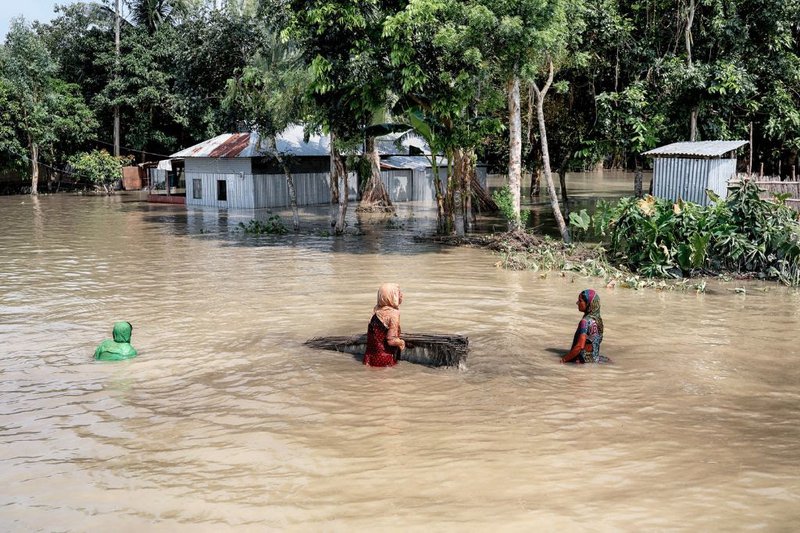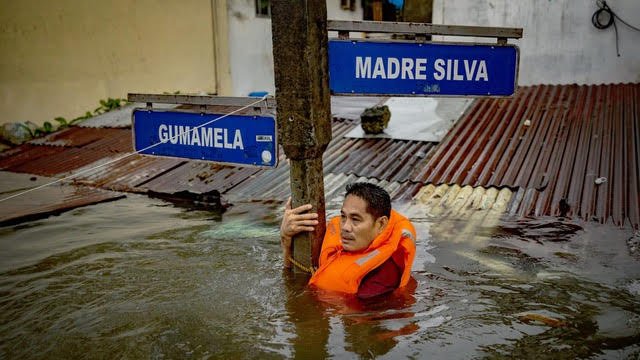
As 2024 comes to a close, I have been reflecting on everything this year has brought—both the challenges and the moments of progress on human induced climate change. The global community faced significant setbacks in addressing human induced climate change, particularly highlighted by the disappointments of COP29, devastating weather events like the floods in Nepal, and the alarming rate of glacier retreat in the Hindu Kush/Himalayas, the Caucuses and other mountain ranges around the world. Furthermore, Africa and Latin America were not immune to human induced climate impacts and experienced severe climate events that emphasized the urgent need for a reevaluation of strategies as we move into 2025.
In 2024, ever-increasing climate induced disasters impacted regions worldwide. Major events included devastating floods in China costing an estimated $15.6 billion and claiming 315 lives, and Hurricane Milton in the U.S., which resulted in $60 billion in damages. Typhoon Yagi wreaked havoc across Southeast Asia, leading to over 800 fatalities and extensive destruction of infrastructure and agriculture. Among the one of the most tragic incidents was here in Nepal, which occurred in July 2024 due to an extreme weather event triggering floods and landslide. These floods displaced thousands, destroyed homes, and resulted in over 200 losses of human lives including in Kathmandu, the capital.

Inadequate emission reductions continued to plague global efforts. In spite of international commitments to curb greenhouse gas emissions, progress has been distressingly insufficient. The United Nations Environment Program (UNEP) reported that global emissions must decrease by over 40% by 2030 to meet Paris Agreement targets; however, current trends indicate an increase instead. This gap between necessary action and actual performance has contributed to a projected temperature rise of between 2.6°C and 3.1°C this century.
The failure of COP29, held in Baku, Azerbaijan, concluded with a disappointing agreement that promised at least $300 billion annually in climate finance to developing countries—an amount that is still far from the $1.3 trillion considered necessary by experts for effective climate action. Lowand middle-income countries labeled the outcome as a "brutal betrayal," noting that it did not include specific targets for adaptation or disaster response funding.
Additionally, climate-induced conflict emerged as a pressing issue aggravated by resource scarcity induced by climate change. Regions like the Middle East and Central Asia have seen strains rise over water resources due to changing precipitation patterns and increased demand from growing populations. The ongoing conflict between Iran and Afghanistan over the Helmand River represents how water scarcity can lead to violence and instability. Similarly, in Yemen, competition for dwindling natural resources amid civil war has intensified local conflicts, undermining efforts for peace. A climate induced conflict in the Himalayas would be much more dire as a recent editorial in the Nepali Times mentions “Research at Rutgers University recently projected that even a one-week nuclear exchange between India and Pakistan would cause the collapse of food systems worldwide, killing 2 billion people from starvation. Prevailing winds would carry the fallout to the Himalaya and Tibetan Plateau, irradiating glaciers that feed into all of Asia’s main rivers.[1]” https://nepalitimes.com/editorial/thinking-the-thinkable
Africa has been disproportionately affected by climate change, despite contributing less than 10% of global greenhouse gas emissions. In 2022 alone, over 110 million people were impacted by climate-related hazards on the continent, leading to economic damages exceeding $8.5 billion. The situation worsened in 2024 with severe droughts and floods exacerbating food insecurity and displacing millions.Somalia faced terrible droughts that displaced over a million people and led to significant loss of livestock and agricultural productivity.
The loss and damage costs in Africa due to climate induced changes are projected to reach between $290 billion and $440 billion as temperatures continue to rise. Adaptation financing remains grossly insufficient; estimates suggest that sub-Saharan Africa alone requires between $30 billion to $50 billion annually for effective adaptation measures. The need for high income countries to commit fully to funding loss and damage is critical as communities struggle with increasing displacement due to climate-induced disasters.

Latin America also faced significant climate challenges in 2024. Extreme weather events such as hurricanes and droughts have led to widespread destruction of infrastructure and agriculture across the region. Countries like Brazil experienced severe flooding that displaced thousands and disrupted food production. In Central America, prolonged droughts have threatened water security and agricultural output, worsening existing vulnerabilities among rural populations.
The Himalayan glaciers are crucial water sources for approximately 2 billion people across South and Southeast Asia. However, these glaciers are melting at an unprecedented rate due to climate change. A recent report warns that if global warming continues unchecked, these glaciers could lose up to 80% of their ice volume by the end of this century. This loss threatens not only ecosystems, biodiversity, culture but also the livelihoods of billions who depend on glacial meltwater for drinking water, agriculture, and energy production.
As we approach 2025, it is clear that transformative ‘out of the box’ thinking and action is warranted. A dedicated laser focused organization must be established to specifically address the impacts of receding Himalayan glaciers and adapting to manage their water resources effectively. This organization should facilitate cooperation among affected countries and coordinate efforts to monitor glacier health.
Developed nations must commit to providing adequate funding that meets the actual needs of developing countries across Africa and Latin America, most importantly, Small Island Developing States (SIDs) and least developed countries (LDCs). Future deliberations must build on existing commitments to phase out fossil fuels and ensure that these pledges are backed by concrete actions and not only rhetoric.
Though 2024 served as a vivid reminder of our failures in addressing climate change—particularly through events like COP29, floods in Nepal, severe impacts in Africa and Latin America, and the disastrous retreat of Himalayan glaciers—it also presents an opportunity for transformative action in 2025. By prioritizing and addressing glacier retreat through focused organizations, enhancing cooperation globally, investing in innovative solutions, mobilizing the private sector and fostering public engagement, we can begin to turn the tide against this existential threat of human induced climate change with “out of the box” thinking and strategies. Wishing all a productive, prosperous and a peaceful 2025.

Arup Rajouria
is an internationally recognized expert in climate change and natural resources management, with an impressive career at renowned organizations such as the former CEO of NTNC's CEO, UNDP, UN-Habitat, UNEP, and USAID. He obtained an MPA degree from Harvard
- Himalayan Meltdown: Threat Beyond Borders
- May 10, 2024
- Navigating The River of Doubts: The Evolving Dynamics Of India-Nepal Water Relations
- Jan 08, 2024
- A Cry From The Himalayas: Echoes Of Hope And Compromise At COP-28
- Dec 21, 2023
- Climate Crisis: Can world Leaders Rise to the Challenge ?
- Nov 17, 2023
- Conflict Diverts Attention: How the Hamas Israel Crisis Affects Climate Priorities At COP 28
- Oct 28, 2023














